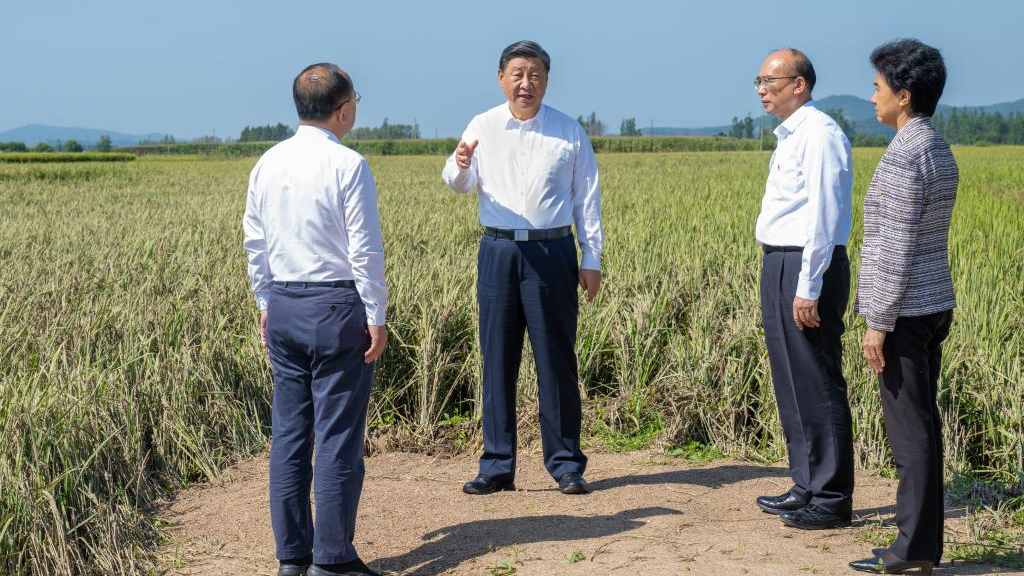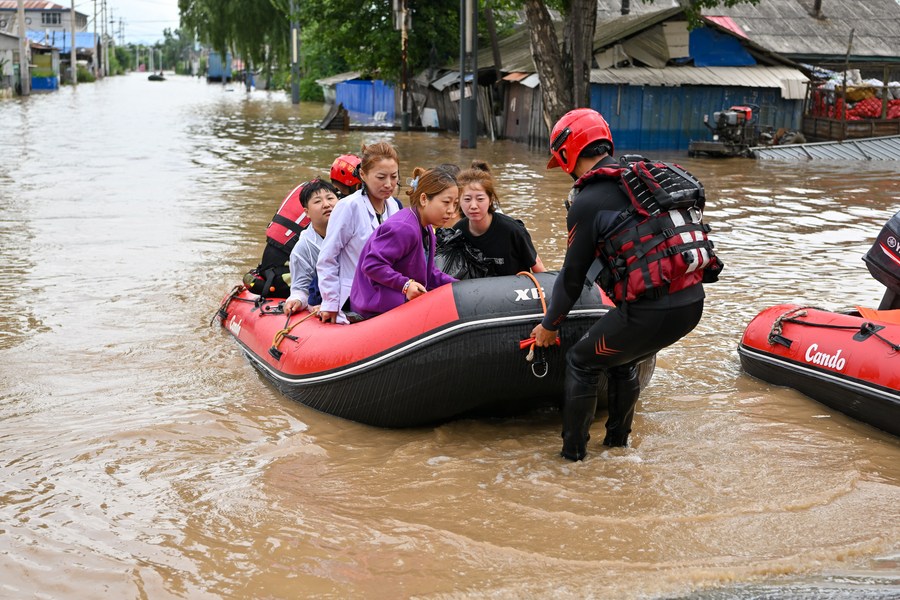
General Secretary of the Communist Party of China Central Committee Xi Jinping, also Chinese president and chairman of the Central Military Commission, walks into the fields to check the impact of the floods on the rice crops in the village of Longwangmiao, Shangzhi City, northeast China's Heilongjiang Province, September 7, 2023. /Xinhua
General Secretary of the Communist Party of China Central Committee Xi Jinping, also Chinese president and chairman of the Central Military Commission, walks into the fields to check the impact of the floods on the rice crops in the village of Longwangmiao, Shangzhi City, northeast China's Heilongjiang Province, September 7, 2023. /Xinhua
Editor's note: Gao Lei is an associate professor at the Center for Xi Jinping Thoughts on Opening-up, Research Institute of Globalization and China's Modernization, University of International Business and Economics. Xia Lu is an associate professor and research fellow at the National Academy for Development and Strategy, the Academy of Xi Jinping Thoughts on Socialism with Chinese Characteristics for a New Era, Renmin University of China. The article reflects the authors' opinions and not necessarily the views of CGTN.
Chinese President Xi Jinping, also the general secretary of the Central Committee of the Communist Party of China (CPC), paid his domestic inspecting tour to Longwangmiao, a small village at Shangzhi, a rural and agriculture base of Heilongjiang Province in the northeast region, that has been badly influenced by the flood since early August.
President Xi's visit to Longwangmiao, literally meaning the Temple of the Dragon King, who had been bestowed with the power of managing rain, flood, and other water-related natural phenomena and whose temple according to Chinese traditional mythology could be free from all floods, is thus having a strong symbolic significance. The heavy rain and related geological disasters caused by the recent series of typhoons have been exerting unprecedented impact upon most parts of China, ranging from north to south, from coastal areas to hinterland, and from urban centers to major grain-producing bases in rural areas. Chinese authorities at various levels have taken solid actions in promoting post-disaster recovery and rebuilding housing and production facilities.
Prompt response as the CPC's tradition and advantage
Prompt responses to people's needs and societal aspirations have been the CPC's tradition ever since it initiated the great cause of revolution and socialist construction and have also become one of the strong advantages of the Party, compared to other ruling parties in both West and East. In its early stages, from 1921 to 1927, the CPC followed the prototypical revolutionary approach set by the Communist International, focusing mainly on the mobilization of the fledgling Chinese working class in urban centers. Yet, the problem of China back then was by no means a pure urban-industrialization-related issue; rather, the country still had to tackle major issues related to a large proportion of peasantry and tenants in its population. Therefore, young communists like Mao Zedong and Peng Pai for the first time made it clear that without prompt and effective responses to the Chinese peasantry's needs, there would be no final success to the Chinese revolution. And it was just this response that had made a part of the CPC's tradition and advantage.
In early 1949, right before the founding of the People's Republic of China, at the second plenary session of the seventh Central Committee at Xibaipo, a mountainous village not far from Beijing, the CPC made another prompt response to people's needs and societal aspiration, i.e., to rapidly modernize China via industrialization. Since then, different generations of the CPC leadership have always kept that promise in mind, making attempts to bring Chinese modernization into reality.
In early 1978, the National Science Conference was held, even before the famous third plenary session of the 11th Central Committee, which was held at the end of the same year. The fact showed that the reform-minded leadership valued the significant contribution of scientific and technological innovation to socioeconomic development and China's modernization, which was also the societal aspiration at the outset of China's reform and opening-up. With the National Scientific and Technological Development Plan and other reform measures being put into effect China started to experience long-term prosperity, and Chinese people from all walks of life began to appreciate a modernized lifestyle.

Firefighters transfer stranded residents in Yanshou County of Harbin, northeast China's Heilongjiang Province, August 5, 2023. /Xinhua
Firefighters transfer stranded residents in Yanshou County of Harbin, northeast China's Heilongjiang Province, August 5, 2023. /Xinhua
Prompt response shows government accountability
This summer witnessed serious weather and related geological disasters that had not been seen for a long time. In fact, before going to Heilongjiang, President Xi had made clear direction and instruction in early July that the CPC organizations and governments at all levels should take quick action immediately after the rain fell and flood came and that they should put the safety of people's life and property as priority.
The Chinese government is a government that takes full responsibility and unlimited accountability, especially when people's livelihood and property are impeded by severe conditions. As President Xi said in his first meeting with the press after the 18th National Congress of the CPC in 2012, people's longing for a better life was the major struggle goal of the Party, and the Chinese governments at all levels had always shouldered this task with a people-centered philosophy.
Only by adhering to this philosophy can we have a correct outlook on development and Chinese modernization. Needless to say, the people-centered development concept is not abstract and esoteric, that cannot remain at the theoretical level, but it must be embodied in all links of economic and social development. What we've seen in the post-disaster reconstruction in different places is guided by this philosophy, with the primary focus on rebuilding people's housing and other basic facilities, because the cold weather would arrive very soon, especially for northern and northeastern China, as well as rescuing farming products as much as possible, for these are not only the fruit of farmers' hard work but also the basis for food security for entire China.
As we mentioned in our previous pieces, there is a clear theme that runs through President Xi's inspecting visits to different places: showing concern for people's livelihood and displaying the Party's accountability.
(If you want to contribute and have specific expertise, please contact us at opinions@cgtn.com. Follow @thouse_opinions on Twitter to discover the latest commentaries in the CGTN Opinion Section.)